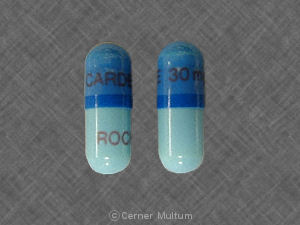Cardene Dosage
Generic name: nicardipine hydrochloride
Dosage form: sustained release capsules
Drug class: Calcium channel blockers
Medically reviewed by Drugs.com. Last updated on Apr 11, 2025.
The dose of CARDENE SR should be individually adjusted according to the blood pressure response beginning with 30 mg two times daily. The effective doses in clinical trials have ranged from 30 mg to 60 mg two times daily. The maximum blood pressure lowering effect at steady-state is sustained from 2 hours until 6 hours after dosing.
When initiating therapy or upon increasing dose, blood pressure should be measured 2 to 4 hours after the first dose or dose increase, as well as at the end of a dosing interval.
The total daily dose of immediate release nicardipine (CARDENE) may not be a useful guide to judging the effective dose of CARDENE SR. Patients currently receiving immediate release nicardipine may be titrated with CARDENE SR starting at their current total daily dose of immediate release nicardipine and then reexamined to assess the adequacy of blood pressure control.
Concomitant Use With Other Antihypertensive Agents
- Diuretics: CARDENE may be safely coadministered with thiazide diuretics.
- Beta-Blockers: CARDENE may be safely coadministered with beta-blockers (see Drug Interactions).
Special Patient Populations
Renal Insufficiency
Although there is no evidence that CARDENE SR impairs renal function, careful dose titration beginning with 30-mg CARDENE SR bid is advised (see PRECAUTIONS).
Hepatic Insufficiency
CARDENE SR has not been studied in patients with severe liver impairment (see PRECAUTIONS).
Congestive Heart Failure
Caution is advised when titrating CARDENE SR dosage in patients with congestive heart failure (see WARNINGS).
More about Cardene (nicardipine)
- Check interactions
- Compare alternatives
- Drug images
- Side effects
- During pregnancy
- Drug class: calcium channel blockers
- Breastfeeding
Patient resources
Other brands
Professional resources
Other formulations
Related treatment guides
See also:
Further information
Always consult your healthcare provider to ensure the information displayed on this page applies to your personal circumstances.


